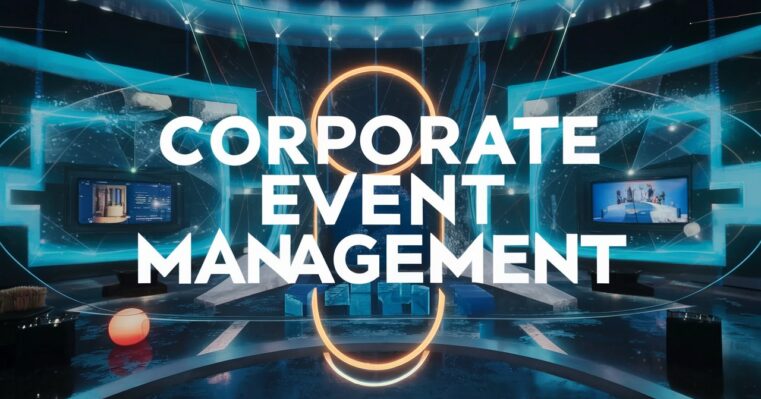Corporate events are essential for any business, whether it's a small startup or a large corporation. These events serve as a platform for networking, team building, and showcasing products or services. However, planning and executing a successful corporate event requires a lot of time, effort, and expertise. This is where corporate event management comes into play.
Corporate event management involves the coordination and organization of various aspects of an event, such as venue selection, logistics, catering, entertainment, and more. It's a crucial role that requires a deep understanding of event planning, marketing, and project management. In this comprehensive guide, we'll dive into the world of corporate event management and explore its importance, process, and best practices.
Why Corporate Event Management Matters
Corporate events provide businesses with opportunities to achieve various goals, from promoting their brand to strengthening relationships with clients and employees. However, without proper management, these events can quickly turn into disasters.
Imagine a product launch event where key speakers are delayed due to transportation issues, or a company retreat where the activities planned are not suitable for the attendees. These scenarios not only reflect poorly on the company but also result in wasted time, money, and resources.
This is where corporate event management comes in. By entrusting the planning and execution of your corporate events to professionals, you can ensure that everything runs smoothly, allowing you to focus on your business objectives. Additionally, event management companies have extensive experience and resources, enabling them to handle last-minute changes and challenges effectively.
The Process of Corporate Event Management
Corporate event management is a multi-step process that involves several tasks and responsibilities. While each event may have unique aspects, the overall process remains the same. Here's a breakdown of the steps involved in corporate event management:
1. Defining the Objectives and Goals
The first step of event management is to define the objectives and goals of the event. This involves understanding the purpose of the event, the target audience, and the desired outcomes. For example, the objective of a product launch event may be to generate buzz and media coverage for the product.
2. Creating a Budget
Once the objectives are defined, the next step is to create a budget for the event. This includes estimating the costs of venue rental, catering, entertainment, marketing, and other expenses. A detailed budget helps in keeping track of expenses and ensures the event stays within its allocated funds.
3. Venue Selection and Logistics
Choosing the right venue is crucial for the success of any event. This involves considering factors such as location, capacity, amenities, and accessibility. Event management companies have extensive knowledge of different venues and can help in finding the perfect one for your event.
Logistics, such as transportation, accommodation, and audio-visual equipment, also need to be taken into account when planning an event. These details can make or break an event, so it's essential to have a reliable event management team to handle them.
4. Marketing and Promotion
Effective marketing and promotion play a significant role in attracting attendees to corporate events. Event management companies use various strategies, such as social media, email marketing, and print advertising, to reach out to potential attendees and create buzz around the event.
5. Event Execution
On the day of the event, the event management team takes care of all the logistics, ensuring everything runs smoothly. They oversee the registration process, manage the schedule, and handle any last-minute changes or issues.
6. Post-Event Evaluation
After the event, it's essential to evaluate its success based on the defined objectives. This not only helps in measuring the impact of the event but also provides insights for future events.
Best Practices for Corporate Event Management
To ensure a successful corporate event, here are some best practices that event management companies follow:
1. Start Early
Event management involves many tasks and responsibilities, so it's crucial to start planning early. This allows for more time to find the perfect venue, negotiate with vendors, and resolve any potential issues.
2. Have a Backup Plan
No matter how well-planned an event is, there's always a chance of something going wrong. That's why having a backup plan in place is crucial. Event management companies always have contingency plans in case of unexpected situations, ensuring the success of the event.
3. Pay Attention to Detail
Details can make or break an event. It's essential to pay attention to every aspect, from the decorations to the food menu. Event management companies have an eye for detail and ensure that every element of the event aligns with its objectives.
4. Utilize Technology
With the advancement of technology, event management has become more efficient and streamlined. Event management companies use various tools and software to manage tasks such as registration, ticketing, and attendee engagement.
How to Use Corporate Event Management
Corporate event management can be used in various settings, including product launches, conferences, team building activities, and more. Here are three examples of how corporate event management was used successfully:
1. Apple's Worldwide Developers Conference (WWDC)
Apple's annual WWDC event is a prime example of how corporate event management can be used to create hype and generate buzz around a new product launch. The event features keynote speeches, product announcements, and hands-on labs for developers to explore new technologies. The use of advanced technology, carefully selected speakers, and strategic marketing has made WWDC one of the most highly anticipated events of the year.
2. Google's Team Building Retreat
Google is known for its innovative and collaborative work culture, and their team building retreats are no exception. These events are designed to bring employees together, build stronger relationships, and foster creativity. From unique activities to team-building exercises, Google's event management team ensures that these retreats are both fun and effective.
3. Microsoft Ignite Conference
Microsoft's annual Ignite conference is a massive event that showcases the company's latest technologies and innovations. The event attracts tens of thousands of attendees from all over the world, making it one of the largest tech conferences in the industry. Event management plays a crucial role in managing logistics, promoting the event, and ensuring that attendees have an unforgettable experience.
Corporate Event Management vs. Personal Event Planning
While corporate event management and personal event planning may seem similar, there are significant differences between the two. Personal event planning involves organizing social events such as weddings, birthdays, or baby showers, while corporate event management focuses on planning and executing business-related events.
Corporate event management also requires a different skill set, including marketing, project management, and negotiation skills, compared to personal event planning. Additionally, corporate events tend to be larger and more complex, requiring a higher level of expertise and resources.
Expert Advice for Corporate Event Management
As an expert in the field of corporate event management, I have a few pieces of advice to share:
- Communicate effectively with all parties involved in the event, including clients, vendors, and team members.
- Pay attention to detail and plan for any potential issues or challenges.
- Use technology and data to measure the success of the event and make improvements for future events.
- Stay updated with the latest event trends and incorporate them into your event planning.
- Build strong relationships with vendors and partners for a smoother planning process.
FAQs about Corporate Event Management
1. What services does an event management company provide?
Event management companies provide various services, including venue selection, catering, marketing and promotion, logistics management, and event execution.
2. How much does corporate event management cost?
The cost of corporate event management can vary greatly depending on the scale, type, and location of the event. It's best to consult with an event management company for a detailed quote.
3. Can I plan a corporate event without using an event management company?
While it's possible to plan a corporate event without using an event management company, it requires a lot of time, effort, and expertise. An event management company can save you valuable resources and ensure a successful event.
4. How far in advance should I start planning a corporate event?
It's advisable to start planning a corporate event at least six months in advance to allow sufficient time for venue selection, vendor negotiations, and other logistical tasks.
5. What are some common challenges faced in corporate event management?
Some common challenges in corporate event management include last-minute changes, budget constraints, and unforeseen issues such as weather or technical difficulties.
Conclusion
Corporate event management plays a crucial role in the success of any business event. By understanding the objectives and goals of the event, creating a budget, carefully selecting the venue and vendors, and utilizing technology and best practices, event management companies can ensure that every event is a success. With this guide, you now have a better understanding of the importance, process, and best practices of corporate event management. So go ahead and plan your next corporate event with confidence!






